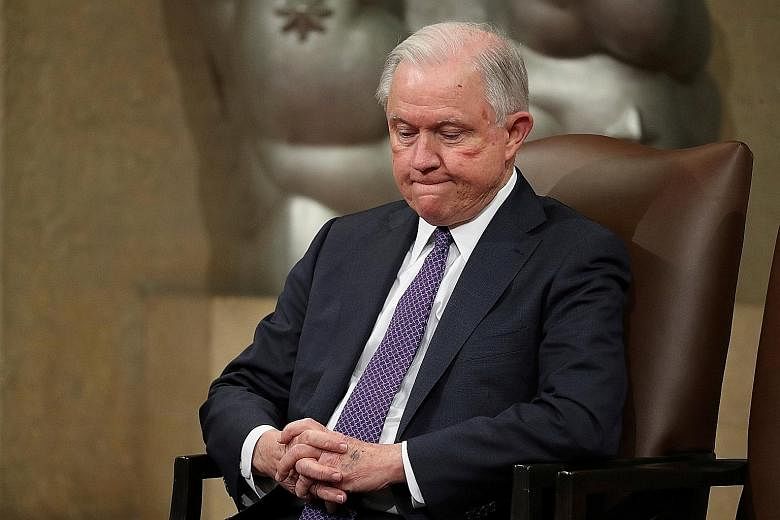The forced resignation of beleaguered US Attorney-General Jeff Sessions has cast doubts over the fate of special counsel Robert Mueller's probe into whether Russia had interfered in the 2016 presidential polls, even as Democrats rallied to protect the probe.
Mr Sessions' de facto firing on Wednesday, which came a day after Democrats gained control of the House of Representatives in the midterm elections, raised fears that Mr Donald Trump may be stepping up efforts to shut down the Russia investigation that has dogged his presidency for months.
The ousted Mr Sessions was technically Mr Mueller's boss, but recused himself from the probe to avoid any conflict of interest because he had been an adviser on Mr Trump's election campaign, a decision which led to him falling out of the President's good graces.
Mr Trump had made his unhappiness publicly known, griping that he would not have picked Mr Sessions for the post, had he known the Attorney-General would step aside to allow the "witch hunt" go on.
The firing may have also been a way for Mr Trump to get ahead of any efforts by the newly-empowered Democrats to reopen the House intelligence committee's investigation into ties between Mr Trump's campaign team and Russia. The committee under the Republicans had found no evidence of collusion in April this year.
Mr Trump had wanted to fire Mr Sessions sooner, reported the Associated Press, but was persuaded by aides not to do so until after the midterm elections as it could have hurt the Republican Party at the ballot box.
Mr Sessions' chief of staff Matthew Whitaker - who has been appointed Acting Attorney-General - will now oversee the probe, taking over from Deputy Attorney-General Rod Rosenstein, who held the responsibility since the recusal.
Mr Whitaker is considered by some as partisan at best and a Trump loyalist at worst. He was a vocal critic of Mr Mueller, arguing in an op-ed for CNN last year that the investigation should not go into the finances of Mr Trump and his family members.
High-ranking Democrats reacted with alarm, calling for Mr Whitaker to recuse himself from the probe.
Said Senate minority leader Chuck Schumer: "Given his previous comments advocating defunding and imposing limitations on the Mueller investigation, Mr Whitaker should recuse himself from its oversight for the duration of his time as Acting Attorney-General."
"It is impossible to read Attorney-General Sessions' firing as anything other than another blatant attempt by (Mr Trump) to undermine and end special counsel Mueller's investigation," House minority leader Nancy Pelosi wrote on Twitter.
As Acting A-G, Mr Whitaker can now tell Mr Mueller what areas to investigate or leave alone. He can also block Mr Mueller from subpoenaing Mr Trump or bringing an indictment, although he must notify Congress if he does so.
More alarmingly for Democrats, Mr Whitaker had himself outlined a specific way to stymie the Russia investigation. "I could see a scenario where Jeff Sessions is replaced with a recess appointment. And that attorney-general doesn't fire Bob Mueller, but he just reduces his budget to so low that his investigation grinds to almost a halt," Mr Whitaker said in an interview with CNN last year.
Democratic congressman Jerry Nadler, who is poised to become the leader of the House judiciary committee, said in a sharply-worded statement that Mr Sessions' firing "fit a clear pattern of interference" from the President in the Mueller investigation.
"There is no mistaking what this means, and what is at stake: this is a constitutionally perilous moment for our country and for the President," said Mr Nadler.
He also warned there would be consequences if Mr Trump is determined to have fired Mr Sessions in order to subvert the rule of law and obstruct justice.
Mr Nadler said the committee has demanded that key officials preserve documents related to the firing, to make sure the probe and any evidence remained safe from improper interference or destruction.
He added that if the firing of Mr Sessions is not immediately investigated, the Democrat-controlled Congress would make it a priority when it is sworn in in January.
The Citizens for Responsibility and Ethics in Washington watchdog group has called on Congress to protect Mr Mueller's job and investigation, saying in a statement:
"So far they have refused, because congressional leaders did not believe there was an immediate threat. They must act now, for the sake of our nation."
A handful of Republicans joined in the chorus, including Utah senator and former presidential candidate Mitt Romney, who wrote on Twitter that it was "imperative... the Mueller investigation proceeds to its conclusion unimpeded".
Activists, meanwhile, called for protests across the country last night to protect the Mueller investigation. By late Wednesday night, hundreds of protest events had been listed on the MoveOn.org advocacy group's website.


